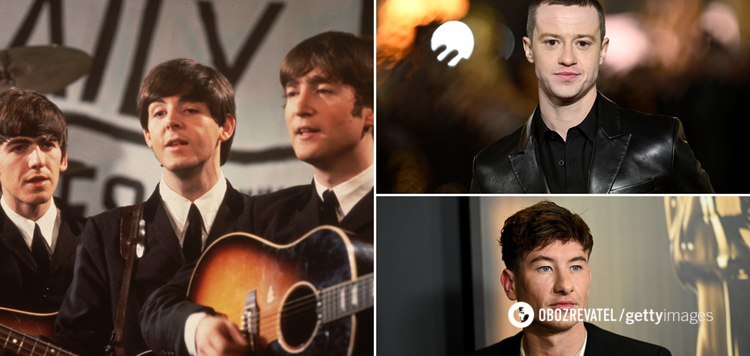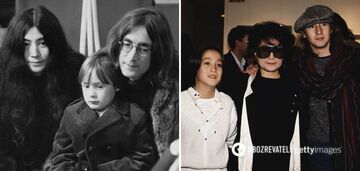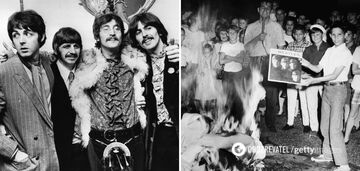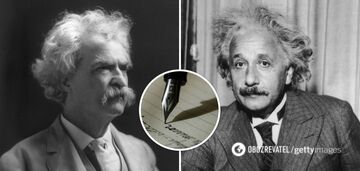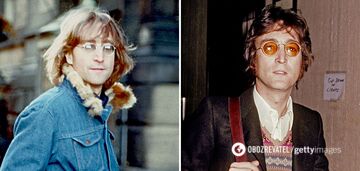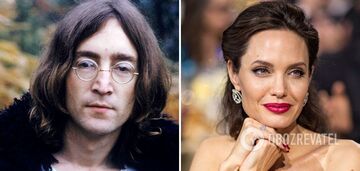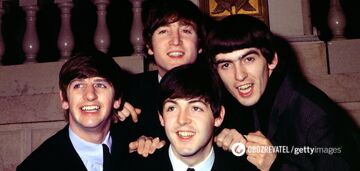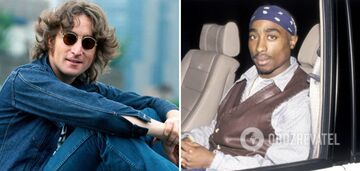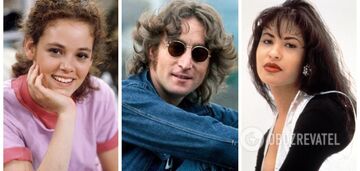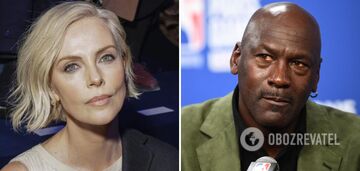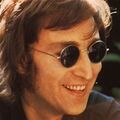
John Lennon
Childhood and youth
John Winston Lennon was born on October 9, 1940 at 6:30 a.m., during a German air raid on Liverpool. His parents were Julia and Alfred Lennon. John was their first and last child - Julia and Alfred separated shortly after his birth.
When Julia Lennon found another man, four-year-old John was taken in by his maternal aunt Mimi and her husband George Smith, who had no children of their own. Mimi was a strict caretaker, and Lennon was often repulsed by this. Lennon found a common language with his uncle, who replaced his father, but in 1953 George died. John then became close to his mother Julia, who lived with her second husband and her two children by him.
Lennon studied poorly, despite his sharp mind - he simply did not tolerate the routine of school life. But at school he managed to reveal his creative abilities - Lennon sang in the choir and published a handwritten magazine, which he illustrated. His favorite books at the time were "Alice in Wonderland" and "The Wind in the Willows". In 1952 Lennon found himself at Quarrybank High School.
In his studies and here he did not achieve much success, quickly finding himself in class C for the most backward students. Lennon regularly broke discipline and drew caricatures of teachers. In the mid-1950s, after the release of Bill Haley's song "Rock around the Clock", Liverpool began a craze for rock 'n' roll.
Lonnie Donegan's song "Rock Island Line" gave birth to skiffle, which quickly gained popularity among English youth. Skiffle was remarkable in that it did not require extensive knowledge of music or the ability to play an instrument well.
Because of this, many youth skiffle bands appeared in England in the 1950s. Rock and roll finally gained popularity after the appearance of Elvis Presley in the United States. The new fascination did not pass Lennon, and in 1956 he and his school friends founded the band "Quarry Men", named after the school where they all studied. Lennon himself played guitar in the Quarry Men.
In addition to him, there were five members: one more also played guitar, two played drums, one played banjo and one, John's best friend Pete Shotton, played washboard. On July 6, 1957, Lennon met Paul McCartney and accepted him into the Quarry Men. McCartney soon brought his friend George Harrison into the band. After failing his final exams at school, Lennon managed (not without the help of the headmaster) to enroll at Liverpool College of Art.
There he became friends with Stuart Sutcliffe, who was also drawn to the Quarry Men, and met his future wife Cynthia Powell. In 1958 (July 15), John's mother died. As she was crossing the road, she was hit by a police officer in a car. Julia's death came as a great shock to Lennon. He later dedicated several songs to her - "Julia", "Mother" and "My mummy's dead". His mother's death greatly affected him in the future. Since Lennon was very much attached to Julia, he looked for his mother in almost all women. The Quarry Men band ceased to exist in 1959 when the name The Beatles came into existence.
Early Beatles
In 1960, the Beatles traveled abroad for the first time, to Hamburg, Germany, where they performed in the clubs of the Reeperbahn, the city's nightlife center. In Hamburg, Lennon tried drugs for the first time - the band had to perform in front of an audience all night long, and the Beatles took pills to endure this marathon.
The Beatles came to Germany several times between 1960 and 1963. During these years they managed to achieve localized popularity in Liverpool and Hamburg. Stuart (Stu) Sutcliffe, the closest person to Lennon during these years, remained living in Hamburg. Sutcliffe found a wife in Germany, the photographer Astrid Kircher. On April 10, 1962 Stu died of a cerebral hemorrhage. At the end of 1961, Brian Epstein became the Beatles' manager. He completely changed their image - the band changed their leather jackets to neat suits with the famous lapel-less jackets, the musicians stopped smoking and swearing on stage. Lennon later admitted that the change of image was not very much to his liking. Nevertheless, the new image contributed to the rapid growth of the Beatles' popularity.
August 23, 1962 - marriage to Cynthia Powell. On April 8, 1963 John and Cynthia Lennon had a son Julian (John Charles Julian Lennon). He was named after Julia, John's mother. Meanwhile, the Beatles were rapidly gaining popularity. If in the spring of 1963 they were well known only in Liverpool, then in October of the same year the whole country knew about them, and in 1964 the Liverpool band became world famous. Lennon took the role of a leader - he announced the numbers at concerts and was always the first to go on stage, although in fact it was impossible to say that one or another member of the Beatles was more important to the group than the others.
In 1964, Lennon for the first time showed himself not only as a musician. A book of his prose and poetry, entitled In His Own Write, was published on March 23, and a second book appeared on June 24, 1965. The original title of the second book - "Spaniard in works" - is a play on words, untranslatable into Russian. In Russia, this book is translated under the title "Spaniard in the Wheel". In addition, Lennon tried himself as an actor. Not counting the movies created by the Beatles, he once starred in a movie: it was the movie "How I Won the War" (English "How I Won the War"). The movie was not a success with either the audience or the critics.
"More Popular Than Jesus."
In 1964-1966, the Beatles were at the height of their fame. They constantly toured the world, released albums twice a year, and starred in two movies: Help! and A Hard Days' Night. In March 1966, Lennon in an interview with the London newspaper "Evening Standard" dropped a careless phrase, saying the following: Christianity will go away. It will fade away and shrivel up. There is no need to argue; I am right and the future will prove it. We are more popular now than Jesus; I don't know which will fade away sooner, rock and roll or Christianity. Jesus was okay, but his followers are stupid and mediocre. And it is their perversion that is ruining the Christianity in me.
No one paid attention to this phrase in Great Britain, but when five months later the phrase, taken out of context, that The Beatles were more popular than Christ, was put on the cover of the American magazine Datebook, a scandal broke out in the USA. In the south of the country, whose inhabitants are known for their religiosity, publicly burned Beatles records, radio stations stopped broadcasting their songs. Even the Vatican condemned Lennon's statement (in 2008, however, the Vatican forgave the musician, saying that his phrase can be regarded as a "witticism").
At the same time, the Beatles were preparing for a US tour. Lennon was forced to apologize for his words, but the concerts during the tour were missing a huge number of spectators. Lennon received death threats: in Memphis, someone called the Beatles' room and said that he (Lennon) would be killed during a concert. After this tour, the Beatles decided to cancel the concerts. They never performed on stage again.
1967-1968
In 1967, Lennon became addicted to drugs under the influence of Timothy Leary's book "The Psychedelic Experience". He became estranged from the rest of the band and gave up his role as bandleader. After Brian Epstein's death, Paul McCartney took over Beatles management.
In 1967, McCartney took over the leadership of the band - the best, according to many, rock album of all time "Sgt. Pepper's Lonely Hearts Club Band" was conceived and realized by him, as well as the TV movie "A Magical Mystery Tour" (English "A Magical Mystery Tour"). "The movie was made by Paul and for Paul," Lennon later told Rolling Stone magazine.
Songs from the 1967-1968 albums, although signed Lennon-McCartney, were overwhelmingly the product of only one of the Beatles. "The White Album", released in 1968, shows how the band members differed from each other during this period.
Song picture During these years, Lennon composed songs that many later recognized as his best works: The philosophical "Strawberry Fields Forever" and "Across the Universe," the psychedelic "I Am the Walrus" and "Lucy in the Sky with Diamonds," the somber "A Day in the Life" and the solemn "All Your Need is Love," which became a hippie anthem. Lennon's appearance, as well as the rest of the band, changed dramatically. The Beatles stopped dressing in neat suits, grew long hair, mustaches and sideburns. In Lennon's image, the famous round glasses appeared for the first time.
Marriage to Yoko Ono
Lennon and Yoko Ono Lennon met avant-garde artist Yoko Ono in 1966 when he stopped by her exhibition at the Indica Art Gallery. Their life together began in 1968, when Lennon divorced his first wife Cynthia. He and Yoko soon became inseparable.
As Lennon said at the time, they were not John and Yoko, but one soul in two bodies, John-and-Yoko. On March 20, 1969, the marriage of John Lennon and Yoko Ono was registered in Gibraltar. After the marriage, Lennon changed his middle name Winston to Ono, and his name was now John Ono Lennon. The couple spent their honeymoon in continental Europe - Paris, Amsterdam and Vienna - before visiting Montreal. Lennon's song about the marriage, "The Ballad of John and Yoko," was released in 1969.
The breakup of the Beatles
Relations within the Beatles finally soured in 1968. Lennon and Paul McCartney had many grievances against each other. Lennon, for example, was not satisfied with the fact that McCartney was pulling the blanket on himself, and the latter was dissatisfied with Lennon's apathy and constant stay in the studio during Yoko Ono's recordings (although at the beginning of their career the Beatles had agreed not to invite wives and girlfriends to the studio).
In addition, their creative collaboration virtually ceased: McCartney continued to write commercial songs and romantic ballads with uncomplicated lyrics, while Lennon increasingly leaned towards psychedelic rock with philosophical themes ("Strawberry Fields Forever"), acid rock ("I am the Walrus") and avant-garde ("Revolution 9").
In 1968, the Beatles were on the verge of breaking up, and Ringo Starr even announced his departure (although he eventually stayed with the band anyway). Many of the recordings on the "White Album" were made with an incomplete lineup, and the song "Julia" was recorded by Lennon alone.
The album "Abbey Road", released in 1969, was also organized by Paul McCartney - the concept of the album belonged to him. "Abbey Road" was in fact the last Beatles album. Released in 1970, "Let It Be" was almost entirely recorded in January 1969 during a concert on the roof of Abbey Road Studios, which became the basis for the movie "Let It Be".
By the time the album was released, Lennon and McCartney had already announced that they were leaving the band. In 1968, two years before the Beatles broke up, John Lennon and Yoko Ono's first album "Unfinished Music No.1: Two Virgins" was released. According to Lennon, the album was recorded in one night.
There was no music on it: the record contained a haphazard collection of noises, moans and screams. The cover of the album was remarkable - it had a picture of a completely naked Lennon and Yoko Ono. In 1969 two studio albums were released: "Wedding Album" and "Unfinished Music No.2: Life With The Lions", which also contained almost no music. In addition, a live recording of "Live Peace In Toronto 1969" was released. Lennon and Yoko Ono formed a group called the Plastic Ono Band.
Political activism and emigration
John Lennon's period of political activism lasted from 1968 to 1972. The beginning of this period was the song "Revolution", which was released on a single and its variation "Revolution 1", which was included on the White Album. By that time Lennon had not yet made up his mind about his position, which can be understood from "Revolution1", where, unlike the original version of the song, the end of the first verse sounds like this: But when you say about destruction Don't you know that you can count me out... in That is, the words by which Lennon renounces violence are followed by the word "in", which gives the line a completely opposite meaning.
Another political song written for the Beatles album was "Come Together", which was released on the "Abbey Road" album. At this time, Lennon had already taken a definite stance - he was in favor of world peace, and even returned the Order of the British Empire to the Queen as a protest against the country's foreign policy. Recording of the song Give Peace a Chance In 1969 Lennon's first public political actions were with Yoko Ono.
After their wedding, they traveled to Amsterdam and announced that they would conduct a "bed interview". Journalists, who thought the star couple would have public sex, gathered at a hotel where it turned out that Lennon and Yoko Ono were simply sitting in bed talking about peace.
After Amsterdam, the demonstration was repeated in Montreal, where Lennon impromptu composed the song "Give Peace a Chance," which became the anthem of the pacifist movement.
On December 15, 1969, the Lennons organized an anti-war concert under the slogan "War will end if you want it to". On December 30 of the same year, British television showed a program dedicated to Lennon and named him one of the three political figures of the decade (along with John F. Kennedy and Mao Zedong). The turbulent political and musical activities led to the fact that in early 1970 Lennon had a psychological crisis.
He was brought out of this crisis by Dr. Arthur Janov, who practiced "primary therapy". With Janov's help, Lennon managed to return to normal, and the treatment methods made a deep impression on him, which is evident on the 1970 album "John Lennon/Plastic Ono Band", which became Lennon's most explicit record.
In 1971 came the album "Imagine", which told of Lennon's utopian dreams. At this time, his political position changed dramatically - he and Yoko Ono took part in a rally in support of the Irish Republican Army, and on the cover of the single "Power to the People" Lennon was depicted in army helmets. From September 1971, Lennon and Yoko Ono lived in New York City.
After a long struggle with the U.S. immigration authorities, who refused to give the couple permission to enter the country because of the 1969 drug scandal, the Lennons still received the right to reside in the U.S.. John Lennon never visited the UK again.
Immediately after moving across the ocean, Lennon became involved in the political life of the United States. He advocated for the granting of civil rights to Indians, for the mitigation of prison conditions, for the release of John Sinclair, one of the leaders of American youth, sentenced to 10 years in prison for possession of marijuana (soon after Lennon's action in support of Sinclair he was released). Lennon's last political album was "Some Time In New York City" (1972), after which his radicalist period ended. The 1973 album Mind Games showed that Lennon's political songs were a thing of the past.
1973-1980
In early 1973, the U.S. authorities granted Yoko Ono official permission to reside in the country, while Lennon, on the contrary, was ordered to leave the United States within two months. Shortly thereafter, the couple quarreled and separated for more than a year. Separation from his wife and creative decline again led to a psychological crisis. Until the summer of 1974 Lennon was practically inactive, and by the beginning of the recording of the new album in August he had only one song ready.
In October 1974, the new album was released under the title "Walls And Bridges". A year later, "Rock'n'Roll" was released, an album of songs the Beatles sang before fame arrived. On October 9, 1975, Lennon's thirty-fifth birthday, he had a son, named Sean. After that Lennon announced that he was ending his musical career and devoted the next 5 years to his son. During all these years, he only appeared in public once - when he was finally given official permission to live in the United States. This happened in 1975, also on October 9. Lennon's next album saw the light of day only in 1980. It was called "Double Fantasy" and received good reviews from critics. This disk was destined to be the last in the work of John Lennon, whose life was cut short a few weeks after the release of the record. Yoko Ono acted as a co-writer of the album.
Death
On the day of his death, Lennon gave his last interview to American journalists, and at 10:50 p.m., as John and Yoko were walking under the archway of their home after returning from the Hit Factory recording studio, Chapman, who had autographed the cover of Lennon's new album "Double Fantasy" earlier that day, fired five shots into his back. A police car summoned by a Dakota usher rushed Lennon to Roosevelt Hospital within minutes. But doctors' attempts to save Lennon were futile - due to massive blood loss, he died, with an official time of death of 11 hours and 07 minutes.
He was cremated in New York, Lennon's ashes were given to Yoko Ono. Mark Chapman is serving a life sentence in a New York prison for his crime. He has petitioned for parole five times now, but each time those petitions have been denied.
Yoko Ono sent a letter to the New York State Department of Parole in 2000 urging that Chapman not be released early. In 1984, John Lennon's posthumous album Milk & Honey was released. The songs were recorded during the last months of Lennon's life. It consists mostly of sessions for Double Fantasy.
Source http://lennon.at.ua/index/0-2

